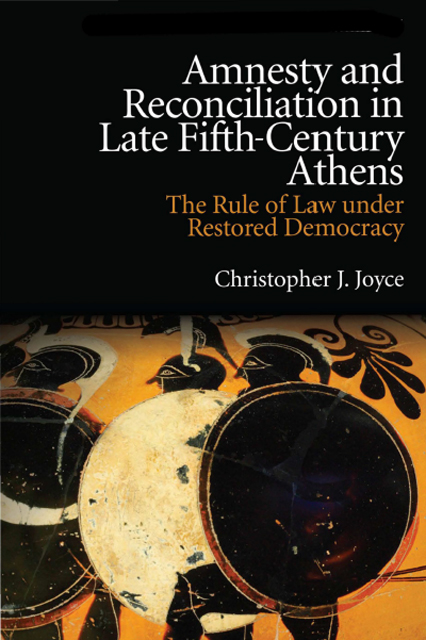Book contents
- Frontmatter
- Contents
- Preface and Acknowledgements
- List of Abbreviations
- 1 Introduction: The Athenian Reconciliation in Modern Scholarship
- 2 Civil Strife at Athens, 404–403
- 3 Oaths and Covenants
- 4 The Legal Scrutiny and the Resurrection of the Rule of Law
- 5 The Amnesty Applied (I): The Trials of Agoratus and Eratosthenes
- 6 The Amnesty Applied (II): The Trials of Callimachus and Socrates
- 7 The Athenian Reconciliation as the Paradigm for the Greek World in the Classical and Hellenistic Ages
- 8 The Rule of Law Restored: The Legacy of the Reconciliation in the Fourth Century
- Bibliography
- Index Locorum
- Subject Index
Preface and Acknowledgements
Published online by Cambridge University Press: 03 June 2023
- Frontmatter
- Contents
- Preface and Acknowledgements
- List of Abbreviations
- 1 Introduction: The Athenian Reconciliation in Modern Scholarship
- 2 Civil Strife at Athens, 404–403
- 3 Oaths and Covenants
- 4 The Legal Scrutiny and the Resurrection of the Rule of Law
- 5 The Amnesty Applied (I): The Trials of Agoratus and Eratosthenes
- 6 The Amnesty Applied (II): The Trials of Callimachus and Socrates
- 7 The Athenian Reconciliation as the Paradigm for the Greek World in the Classical and Hellenistic Ages
- 8 The Rule of Law Restored: The Legacy of the Reconciliation in the Fourth Century
- Bibliography
- Index Locorum
- Subject Index
Summary
What do we mean when we talk about amnesty? In the modern world, amnesty is understood as an initiative to reconcile two or more sides in a political conflict, where vindictive action for offences dating from an internal conflict is forbidden below a certain level. Since the Second World War, such conceptions of amnesty have been witnessed in West Germany, post-Apartheid South Africa and in the former Soviet satellite countries after the end of the Cold War. In all those examples, there was an injunction to make litigation against past offences inadmissible, excepting the most notorious and egregious crimes. In recent times, classical scholars have asked whether the modern paradigm finds a comparable example in Greek antiquity. The purpose of this study is to show that it does. In 404 bce, the Athenian democracy was abolished and replaced by an oligarchy which ruled for eight months, leading to civil war and the eventual reassertion of democracy in 403. To reconcile the two warring sides, legal measures were required to ensure that Athens did not relapse into civil war, or stasis. The Treaty of Amnesty successfully banished civil war and ensured that the losing side would not be subject to recrimination at the hands of the victor. Recent efforts to deny that Athens measured up to the standards of amnesty which the modern world holds essential have, by that estimation, been flawed. The present study argues that the Athenian example of 403 was the paradigm not only for later amnesties in the ancient world, but also for modern amnesty agreements.
This study is the product of over ten years of separate, freestanding publications on the Athenian Reconciliation of 403. Most of my earlier articles addressed technical matters of legal and semantic interpretation. This study aims to understand events of that vital year in a broader historical setting. It begins with the circumstances which led to the overthrow of democracy in 404 and moves, in turn, to the oligarchy, the democratic resurgence of 403, the legal measures which put an end to civil conflict, and the trials which ensued.
- Type
- Chapter
- Information
- Amnesty and Reconciliation in Late Fifth-Century AthensThe Rule of Law under Restored Democracy, pp. vii - ixPublisher: Edinburgh University PressPrint publication year: 2022

